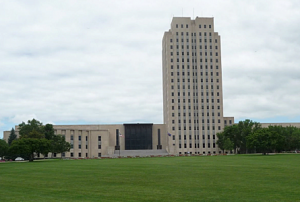 BISMARCK, N.D. (AP) — The North Dakota Legislature will take a closer look at itself this week with a pair of measures aimed at creating rules for a voter-approved constitutional amendment for government ethics oversight.Also expected on the Legislature’s plate are proposals to reimburse lawmakers for meals, charge royalties on wasted natural gas, and measures to hold annual legislative sessions.MEASURE 1
BISMARCK, N.D. (AP) — The North Dakota Legislature will take a closer look at itself this week with a pair of measures aimed at creating rules for a voter-approved constitutional amendment for government ethics oversight.Also expected on the Legislature’s plate are proposals to reimburse lawmakers for meals, charge royalties on wasted natural gas, and measures to hold annual legislative sessions.MEASURE 1
The Legislature has set aside the Capitol’s biggest meeting room on Wednesday to hear testimony on competing Republican and Democratic bills on how to comply with a voter-approved constitutional amendment to overhaul government ethics oversight.
The initiative has provisions to ban foreign money from elections, restrict lobbying and create an independent ethics commission, among other things.
The amendment was framed as anti-corruption. North Dakotans for Public Integrity, the backers of the initiative, say in a statement that the GOP bill does the opposite, by restricting transparency, setting “almost meaningless penalties” and making “a mockery of the people’s vote.”
The group has signaled legal action if the GOP bill becomes law.
House Majority Leader Chet Pollert and his Senate counterpart, Rich Wardner, say their bill “enacts the will of the voters while providing certainty to North Dakotans that they can participate in the democratic process.”
Democratic Sen. Tim Mathern is sponsoring separate legislation that backers believe is more in line with voters’ wishes, said Dina Butcher, who helped lead the initiative.
North Dakota is one of a handful of states without an ethics commission, which Democrats have unsuccessfully promoted for years in the GOP-led Legislature.
___
LAWMAKER’ MEALS
The ethics overhaul already is having an impact on one of the North Dakota Legislature’s little-discussed perks: Free meals from lobbyists and interest groups.
GOP Rep. Keith Kempenich is sponsoring a bipartisan bill that will allow lawmakers who live outside of Bismarck to claim reimbursments for meals. The bill has an estimated two-year cost of more than $400,000, or about $2,800 for each qualified lawmaker during the maximum 80-day session.
Kempenich says the bill was inspired in part by the ethics measure. The Bowman rancher has been in the House since 1993 and says dinners put on by lobbyists and other groups have gone from “steak and lobster to finger food” during that time.
He said energy companies especially have cut down this session, and many lawmakers need the cash to make up for lost meals.
The legislation could reach the House floor for a vote this week.
Lawmakers are paid $495 a month and $177 a day during the session. They receive a housing allowance during the session of more than $1,700 a month.
Lawmakers also are on the health plan that covers state employees. Neither state workers nor lawmakers pay a share of the premium, a benefit that is worth about $1,250 monthly.
___
FLARING ROYALTIES
North Dakota Democrats are pushing legislation that would require companies to pay royalties if they burn and waste natural gas for more than a year.
Natural gas is a byproduct of oil production. But without infrastructure in place to capture it, it is burned — or flared — by oil producers.
The state produced nearly 1.4 million barrels of oil a day in November, the latest figures available. With that came 2.5 billion cubic feet of natural gas per day.
The industry burned off 21 percent of the gas in November. The North Dakota Industrial Commission headed by Gov. Doug Burgum requires companies to limit that to 12 percent. Operators missed the target for the seventh month in a row in November.
The U.S. Energy Department says less than 1 percent of natural gas is flared from oil fields nationwide, and less than 3 percent worldwide.
___
FURLOUGHED FEDERAL WORKERS
An emergency bipartisan bill is expected to be approved this week that would offer no-interest loans to any federal worker in the state who is working and not being paid as a result of the partial government shutdown. It was launched before President Trump on Friday announced a short-term deal to end the shutdown.
The measure sponsored by Republican and Democratic legislative leaders is being fast-tracked and should be on Gov. Burgum’s desk this week.
Local lenders that offer the interest-free loans would be guaranteed by the state-owned Bank of North Dakota, according to the measure.
Job Service North Dakota spokeswoman Sarah Arntson says about 2,000 of the 9,400 federal workers in North Dakota are affected by the shutdown. Arnston says about 300 of them had filed unemployment claims as of Friday.
___
WITHDRAWN CANDIDATES
A Republican-sponsored bill would remedy a peculiarity that occurred in North Dakota’s primary election last year.
The bill would allow candidates to remove their names from a ballot before it is certified.
The measure was inspired by Republican state Sen. Tom Campbell’s quest for the U.S. House race.
The wealthy potato farmer from Grafton withdrew from the race and later supported state Sen. Kelly Armstrong, who won party endorsement and the general election. .
Campbell had filed a petition to run in the primary despite losing the endorsement, but party officials sought to get him to step aside. His name still appeared on the primary ballot.
Campbell spent more than $750,000 of his own money on a Senate campaign. He switched to the House after GOP Rep. Kevin Cramer announced he would challenge incumbent Democrat Heidi Heitkamp.
___
ANNUAL LEGISLATIVE SESSIONS
Proposals for annual sessions have never been popular in the Legislature — the idea has been pushed more than two dozen times over the past 40 years without success — but it’s back again.
The state Constitution says the Legislature can meet for no more than 80 days every two years. Bipartisan legislation led by Democratic Rep. Karla Hanson would keep the 80-day limit, but would allow them to be divided over two years — effectively shifting to an annual meeting.
Proponents say volatile prices for oil and farm commodities are making it difficult for lawmakers to write two-year budgets. And they believe annual sessions of the Legislature will make the job easier.
North Dakota is one of four states where the Legislature still meets every other year.
North Dakota’s Constitution says the Legislature may meet for a maximum of 80 days every two years, not counting special sessions and meetings held to impeach a public official. Since statehood, the Legislature has met every other year, even though the constitution does not require biennial sessions.












Comments are closed
Sorry, but you cannot leave a comment for this post.